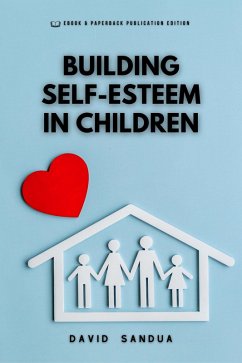
How to Balance Work and Family- A Guide for Busy Parents (eBook, ePUB)
Sofort per Download lieferbar
2,99 €
inkl. MwSt.

PAYBACK Punkte
0 °P sammeln!
Why We Should Stop Praising Our Children for Being Smart is a thought-provoking short read that challenges the traditional approach to praising children's intelligence. In this book, the author explores the concept of a fixed mindset and its potential negative impact on children's development. With a comprehensive table of contents, readers can easily navigate through the various topics covered in this enlightening book.The Fixed Mindset Trap is the first chapter, where the author delves into the dangers of labeling children as ""smart"" and the limitations it can impose on their growth. The P...
Why We Should Stop Praising Our Children for Being Smart is a thought-provoking short read that challenges the traditional approach to praising children's intelligence. In this book, the author explores the concept of a fixed mindset and its potential negative impact on children's development. With a comprehensive table of contents, readers can easily navigate through the various topics covered in this enlightening book.
The Fixed Mindset Trap is the first chapter, where the author delves into the dangers of labeling children as ""smart"" and the limitations it can impose on their growth. The Power of Effort follows, emphasizing the importance of valuing hard work and perseverance over innate abilities. Building Resilience is another crucial aspect discussed, highlighting the significance of teaching children how to bounce back from failures and setbacks.
Fostering a Love for Learning explores strategies to cultivate a genuine passion for acquiring knowledge, while Developing a Growth Mindset delves into the mindset shift necessary for children to embrace challenges and view failures as opportunities for growth. The Impact of Intelligence Praise examines the potential negative consequences of constantly praising children for their intelligence, such as fear of failure and performance pressure.
Comparison and Competition explores the detrimental effects of constantly comparing children to their peers and the importance of fostering a supportive environment. The Role of Effort Praise emphasizes the significance of praising children's efforts rather than their intelligence, encouraging persistence and embracing mistakes as part of the learning process.
Building Self-Confidence focuses on strategies to boost children's self-esteem and belief in their abilities, while Teaching the Value of Hard Work emphasizes the importance of instilling a strong work ethic. Setting Realistic Expectations explores the benefits of setting achievable goals and Emphasizing the Process highlights the value of focusing on the journey rather than just the end result.
Developing a Growth Mindset Culture discusses how to create an environment that nurtures a growth mindset, both at home and in schools. The Importance of Specific Feedback emphasizes the power of providing constructive feedback that focuses on strategies and growth areas. Encouraging Self-Reflection encourages children to reflect on their progress and identify areas for improvement.
Nurturing a Growth Mindset at Home provides practical tips for parents to model a growth mindset and create a safe space for their children to explore and learn. Implementing a Growth Mindset in Schools explores strategies for educators to foster a growth mindset in the classroom, including teaching the power of ""yet"" and providing growth-oriented feedback.
The book concludes with a chapter on Celebrating Progress, highlighting the
This title is a short read. A Short Read is a type of book that is designed to be read in one quick sitting.
These no fluff books are perfect for people who want an overview about a subject in a short period of time.
Dieser Download kann aus rechtlichen Gründen nur mit Rechnungsadresse in A, B, BG, CY, CZ, D, DK, EW, E, FIN, F, GR, HR, H, IRL, I, LT, L, LR, M, NL, PL, P, R, S, SLO, SK ausgeliefert werden.













